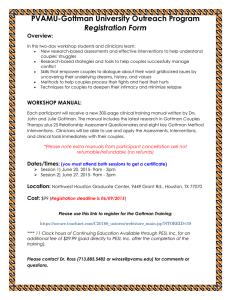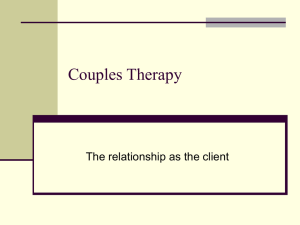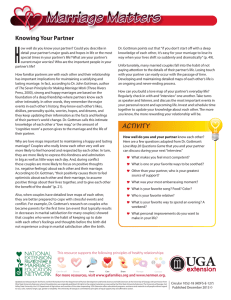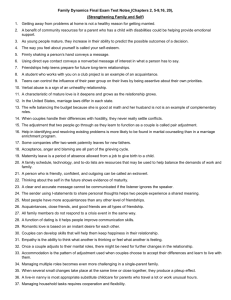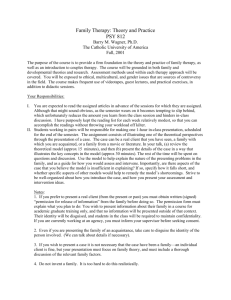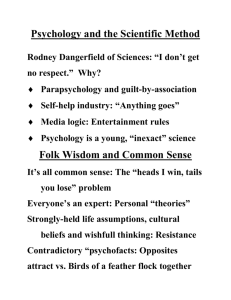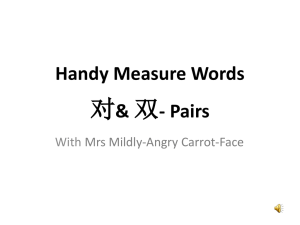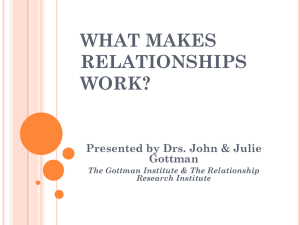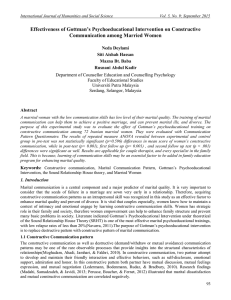Discuss the role of communication in
advertisement
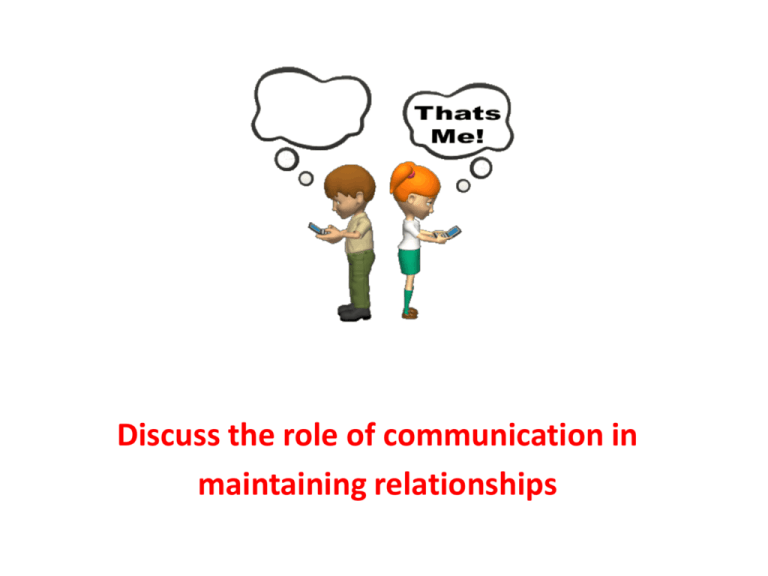
Discuss the role of communication in maintaining relationships Bradbury and Fincham (1990) • Meta-analysis of research on attributions in married couples. Bradbury and Fincham (1990) Happy Couples….. • Spouses in happy relationships tended to focus on their partner’s positive behavior as part of the person’s character. • They were more likely to make attributions that locate the cause of – positive events to dispositional factors in the partner (i.e. positive things happen because of the partner) – negative events to situational factors (i.e. the partner is not to blame). Bradbury and Fincham (1990) Unhappy Couples…. • Spouses in unhappy relationships tended to see their partner’s negative behavior as part of his or her character and downplay the partner’s positive behavior. • They were more likely to make attributions that locate the cause of – positive events to situational factors (i.e. positive events do not happen because of the partner) – negative events to dispositional factors (i.e. the partner is to blame). You will have a conversation with someone of the same gender about a personal problem or issue in your life. Tannen (1990) • Women self-disclose (share inner thoughts/feelings) more than men selfpenetration • Women likelier to respond to others’ negative feelings w/understanding; men offer advice for solving problems (EX: weight gain) Gendered Responses • Women use more overlapping speech • Men interrupt & change topic more • Women = more inclusive; ask for opinion • Men may feel unsupported by women’s sympathetic response Conflict? • Conflict is inevitable. • It is how you handle the conflict that makes the difference!!! Gottman and Krokoff (1989) • The researchers compared data from two longitudinal observational studies of couples. • The couples were observed in their home and in a laboratory discussion either on a low conflict or a highconflict issue. • Conflict was only seen as a negative sign if couples could not resolve it constructively. Gottman and Krokoff (1989) • Results showed that expressions of anger and disagreement were not necessarily associated with marital dissatisfaction over time. • Couples who solved their conflict with mutual satisfaction were more satisfied with their relationship. Gottman and Krokoff (1989) • Couples who avoided conflict were less satisfied. • According to the researchers this is because the couples do not have the opportunity to experience that they can solve conflicts together. Gottman and Krokoff (1989) • Three specific dysfunctional communication patterns (defensiveness, stubbornness, and withdrawal from interaction) were reliably associated with marital dissatisfaction over time. Gottman’s theory of the Four Horsemen of the Apocalypse Communication that predicts marital dissatisfaction 1. Criticism: • Making dispositional attributions (e.g. attacking the partner’s personality or character with the intent of making the partner wrong). Gottman’s theory of the Four Horsemen of the Apocalypse Communication that predicts marital dissatisfaction 2. Contempt: • Attacking the partner’s sense of self with the intention to insult or psychologically abuse him or her (e.g. hostility, sarcasm, mockery). Gottman’s theory of the Four Horsemen of the Apocalypse Communication that predicts marital dissatisfaction 3. Defensiveness: • Seeing yourself as a victim (e.g. making excuses by referring to factors out of your control, crosscomplaining – listening to your partner’s complaint but returning it with a complaint of your own). Gottman’s theory of the Four Horsemen of the Apocalypse Communication that predicts marital dissatisfaction 4. Stonewalling: • Withdrawing from the relationship as a way to avoid (e.g. by silent treatment, monosyllabic response, or changing the subject.
